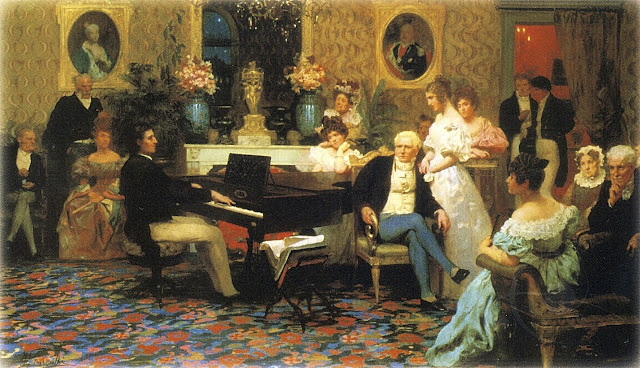The Pocket Paderewski : The Beguiling Life of the Australian Concert Pianist Edward Cahill by Michael Moran
 |
| Edward Cahill (1885-1975) |
 |
| Edward Cahill seated in the front row on the left of Princess Alice at a private Mayfair piano recital at the home of the Dowager Lady Swaythling 1934 |
The Pocket Paderewski
The Beguiling life of the Australian Concert Pianist Edward Cahill
Michael Moran
[Australian Scholarly Publishing, Melbourne, November 2016]
You might like to begin reading this already published biography of my great-uncle, the glamorous Australian concert pianist Edward Cahill (1885-1975), issued some time ago (Melbourne, 2016). It took me six years to write. I feel it is an important biographical contribution to Australian cultural history of an outstanding but now forgotten musical figure who performed internationally at a time when Australian concert artists were relatively unknown in Europe.
I was prompted to this serialization by my detailed coverage of the magnificent, inspired yet in some ways controversial 2020 International Chopin Piano Competition in Warsaw.
Cahill lived a colorful and exciting life during the golden age of classical pianism in the London, Paris and the Riviera of the 1920s and 1930s. The brilliant young pianists who took part in the Chopin Competition today can only dream of such a flamboyant concert and social life.
Synopsis
The glamorous concert pianist Edward Cahill (1885-1975) rose to prominence from humble beginnings in the inauspicious setting of 19th century rural Queensland. At a time when Australian concert artists were relatively unknown in Europe, he dazzled the salons of royalty, aristocratic patronage and privilege in London, Paris and the French Riviera during the glittering decades of the 1920s and 1930s. He was known as 'The Pocket Paderewski' owing to his diminutive stature, shock of tousled hair and brilliant keyboard technique.
His baptism by fire in the travelling silent cinema of the outback, music hall and vaudeville was a surprising grounding for a concert pianist. Yet he became a protégé of Dame Nellie Melba and played for Kings in Southeast Asia and Maharajas in India. Cahill performed for Queen Mary in London and for the Duke and Duchess of Windsor in Paris. Invited for lessons in Cannes by the visionary pianist Alfred Cortot, he was known to the great conductor Wilhelm Furtwängler, the pianist and statesman Ignacy Paderewski and the composer Percy Grainger. In Vienna he took lessons from Leonie Gombrich (mother of the great art historian Ernst Gombrich), a onetime assistant and pupil of the great Polish pedagogue Theodor Leschetizky. In London, Cahill gave some of the first recitals in the modern revival of the Pleyel harpsichord by Wanda Landowska.
His concert tours of Nazi Germany tragically sundered an intense romance and musical partnership with the beautiful Austrian Jewish violinist Sabine Adler. After spending the war years in Switzerland giving charity concerts of Chopin for Polish interned troops, he took a courageous stand against apartheid as a resident of South Africa, passing his declining years in Monaco.
The search for the enigma of ‘Uncle Eddie’ has been a rich family quest. As a musician, I was fascinated by this charismatic figure, the legend who loitered in the shadows of inherited memory. Set against the dramatic backdrop of the age, this historical biography is a portrait of the prodigious musical gifts, infectious charm and unswerving determination that transported the pianist Edward Cahill from pastoral, colonial isolation to brilliant European stardom.
Performance Reviews
A marvellous musician who was able to play magisterially but limpidly, full of charm and yet with forensic intelligence and insight. One can only regret not knowing sooner about this great artist.
Dr. Leslie Howard - Distinguished pianist, composer and musicologist. Acclaimed performer of Liszt
Cahill plays throughout with irrepressible spirit and energy.The character of each piece is clearly projected and his appreciation of what the music is ‘about’ is faultless. It is easy to visualise his virtuoso panache.
James Methuen-Campbell - International authority on Chopin interpretation
Cahill’s playing is passionately driven, full of excitingly forthright strength, but with a formal grip and sense of cadence that give it true command, shot through with unmistakeable touches of originality and tonal nuance.
Piers Lane - Australian pianist of worldwide distinction
The book is serialized, fulsomely illustrated and the chapters divided into installments
Click on this link to read the installments




Comments
Post a Comment